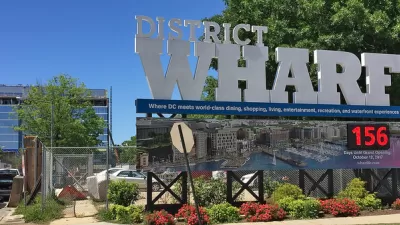Subtle design interventions can facilitate safe navigation in urban environments for people with cognitive abilities effected by dementia.

Washington, D.C. is one of many cities with a growing population of older adults. "31% of the region’s population growth between now and 2045 will comprise people over the age of 65. Among these hundreds of thousands of people, up to a quarter will have dementia and other memory loss at some point in their lives," writes Jonathan Paul Katz.
Many lives could be improved by prioritizing design interventions that make urban spaces more usable for people with dementia, says Katz. Contrary to popular belief, the word dementia describes a range of conditions and experiences related to cognitive decline. Kats further asserts that people with dementia, however, can age in their communities rather than in an institutional situation.
Katz' article describes the difficulties faced by people with dementia in navigating an urban environment: "Skills that we take for granted are difficult for older adults with dementia, including the ability to find alternative routes, filter out extraneous sensory information, or remember directions."
Katz wants people wracking their brains to invent helpful design interventions to know that "walkable urban design and dementia-friendly design are often one and the same. There are also specific interventions that can make public spaces easier for people with dementia, including wayfinding, sensory and generational variation, and special attention to sitting areas and surfaces."
Read Katz' article to learn about a case study of The Wharf in Washington, D.C., in which designers provided sensory cues to help people affected by dementia navigate during their visit.
FULL STORY: Good urban design can make Greater Washington more dementia-friendly

Alabama: Trump Terminates Settlements for Black Communities Harmed By Raw Sewage
Trump deemed the landmark civil rights agreement “illegal DEI and environmental justice policy.”

Study: Maui’s Plan to Convert Vacation Rentals to Long-Term Housing Could Cause Nearly $1 Billion Economic Loss
The plan would reduce visitor accommodation by 25% resulting in 1,900 jobs lost.

Planetizen Federal Action Tracker
A weekly monitor of how Trump’s orders and actions are impacting planners and planning in America.

Waymo Gets Permission to Map SF’s Market Street
If allowed to operate on the traffic-restricted street, Waymo’s autonomous taxis would have a leg up over ride-hailing competitors — and counter the city’s efforts to grow bike and pedestrian on the thoroughfare.

Parklet Symposium Highlights the Success of Shared Spaces
Parklets got a boost during the Covid-19 pandemic, when the concept was translated to outdoor dining programs that offered restaurants a lifeline during the shutdown.

Federal Homelessness Agency Places Entire Staff on Leave
The U.S. Interagency Council on Homelessness is the only federal agency dedicated to preventing and ending homelessness.
Urban Design for Planners 1: Software Tools
This six-course series explores essential urban design concepts using open source software and equips planners with the tools they need to participate fully in the urban design process.
Planning for Universal Design
Learn the tools for implementing Universal Design in planning regulations.
Caltrans
Smith Gee Studio
Institute for Housing and Urban Development Studies (IHS)
City of Grandview
Harvard GSD Executive Education
Toledo-Lucas County Plan Commissions
Salt Lake City
NYU Wagner Graduate School of Public Service




























